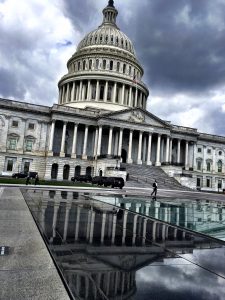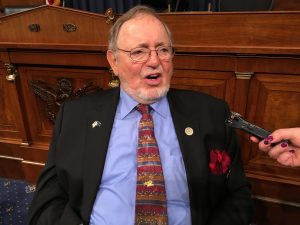
Alaska tribal courts could get a power boost if Congress passes a bill the House is debating to renew the Violence Against Women Act, or VAWA.
The bill would allow up to five Alaska tribes territorial jurisdiction in their villages to prosecute crimes like domestic assault, sexual violence and stalking, whether the accused is a tribal member or not.
Congressman Don Young spoke on the House floor in favor of the Alaska pilot program. He cited grim statistics, saying women in Alaska Native villages suffer the highest sexual abuse rates in the nation.
“Yet Native villages currently lack any efficient tools to criminally prosecute the offenders,” he said.
Tribal courts are already taking domestic violence cases, but jurisdiction can be tricky. That’s because, with one exception, Alaska tribes don’t have reservations, or a specific geographic area where their laws apply. The VAWA bill aims to solve that, at least experimentally. Tribes participating in the pilot program would get Indian Country jurisdiction, like Lower 48 tribes have over reservations, to enforce VAWA crimes.
The version of the bill that reached the House floor said jurisdiction would be limited to certain lands owned by Alaska Natives, or Native groups. Young submitted an amendment to expand the area.

“My amendment would add jurisdiction of all lands inside Alaska Native villages, to cover where the majority of violence actually occurs,” he said.
Young’s amendment passed. It says, for the pilot project, a tribe can have jurisdiction over a village that is at least 75 percent Alaska Native.
Kenai attorney Andy Pevehouse foresees a problem.
“The question is, does the village have a defined border?” he asked.
Pevehouse represents a former Togiak resident, a non-Native man named Ronald Oertwich. By the authority of Togiak tribal court, Oertwich was banished from the community in 2017, allegedly for bootlegging whiskey. Last week, Pevehouse filed a lawsuit in federal Court on behalf of Oertwich, against the village, the tribal judges, the city of Togiak and the state. Pevehouse disputes the Togiak tribal court had the authority to prosecute his client.
“If the tribe can assert jurisdiction absent geography or membership, then where does the tribe’s jurisdiction stop?” he asked.
The tribe has not yet responded to the lawsuit and its attorney did not answer our interview request.
Debate over the VAWA renewal bill continues in the U.S. House.
Liz Ruskin is the Washington, D.C., correspondent at Alaska Public Media. Reach her at lruskin@alaskapublic.org. Read more about Liz here.





